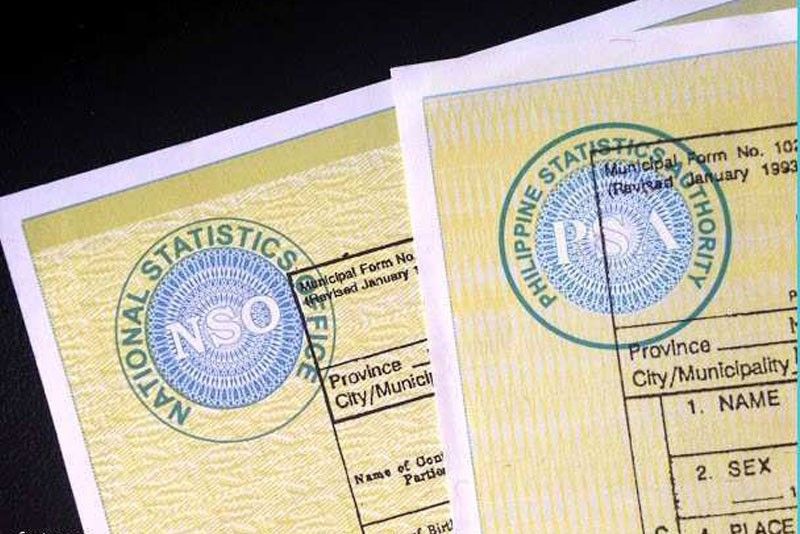3 rules in correction of civil registry entries
 In short, there is no need to go to court when what is sought is to "change
and correct" matters which can easily be established. A person may do this if
her "sex" in her birth certificate should be changed from male to female;
proof of this can easily be procured. Day or month in a persons' birth
certificate may be corrected administratively but not their year of birth
which has more far-reaching effects. The same far-reaching effects are
expected in change last names, which is why last names/surnames can only be
corrected or changed via a judicial petition.
In short, there is no need to go to court when what is sought is to "change
and correct" matters which can easily be established. A person may do this if
her "sex" in her birth certificate should be changed from male to female;
proof of this can easily be procured. Day or month in a persons' birth
certificate may be corrected administratively but not their year of birth
which has more far-reaching effects. The same far-reaching effects are
expected in change last names, which is why last names/surnames can only be
corrected or changed via a judicial petition.
Finally, in number "1)" above, the requirement of patently clear clerical or typographical error or mistake must still be complied with. An example of this would be, instead of being named "Mark," a person is registered as "Markk."
SECOND. A person seeking 1) to change his or her surname or 2) to change both his or her first name and surname may file a petition for change of name under Rule 103, provided that the jurisprudential grounds[3] discussed in Republic v. Hernandez[4] are present.
Change of surname, including change of first name and surname, have
more far-reaching effects than those mentioned in number "1)" above.
THIRD. A person seeking substantial cancellations or corrections of
entries[5] in the civil registry may file a petition for cancellation or
correction of entries under Rule 108. As discussed
in Lee v. Court of Appeals[6] and more recently,
in Republic v. Cagandahan,[7] R.A. 9048 "removed from the ambit of
Rule 108 of the Rules of Court the correction of such errors.
Rule 108 now applies only to substantial changes and corrections
in entries in the civil register."[8]
In one case involving a stolen identity, whereby a woman's name was used in the marriage certificate of a Korean, the Supreme Court allowed the use of Rule 108 as a vehicle to "correct the entry" and to cancel the "wife portion" of the certificate. The Solicitor General opposed, saying that this is a circumvention of the law on termination of marriage. However, the High Court explained:
While we maintain that Rule 108 cannot be availed of to determine the validity of marriage, we cannot nullify the proceedings before the trial court where all the parties had been given the opportunity to contest the allegations of respondent; the procedures were followed, and all the evidence of the parties had already been admitted and examined. Respondent indeed sought, not the nullification of marriage as there was no marriage to speak of, but the correction of the record of such marriage to reflect the truth as set forth by the evidence. Otherwise stated, in allowing the correction of the subject certificate of marriage by cancelling the wife portion thereof, the trial court did not, in any way, declare the marriage void as there was no marriage to speak of.[9]
[2] R.A. 9048, Sec. 1., as amended by R.A. 10172, Sec. 1. Authority to Correct Clerical or Typographical Error and Change of First Name or Nickname.
[3] Republic v. Hernandez, 323 Phil. 606, 637-638 (1996):
x xx Jurisprudence has recognized, inter alia, the following grounds as being sufficient to warrant a change of name: (a) when the name is ridiculous, dishonorable or extremely difficult to write or pronounce; (b) when the change results as a legal consequence of legitimation or adoption; (c) when the change will avoid confusion; (d) when one has continuously used and been known since childhood by a Filipino name and was unaware of alien parentage; (e) when the change is based on a sincere desire to adopt a Filipino name to erase signs of former alienage, all in good faith and without prejudice to anybody; and (f) when the surname causes embarrassment and there is no showing that the desired change of name was for a fraudulent purpose or that the change of name would prejudice public interest.See also Republic v. Coseteng-Magpayo, 656 Phil. 550, 555-556 (2011).
[4] Id.
[5] RULES OF COURT, Rule 108, Sec. 2. provides:
Entries subject to cancellation or correction. — Upon good and valid grounds, the following entries in the civil register may be cancelled or corrected: (a) births: (b) marriage; (c) deaths; (d) legal separations; (e) judgments of annulments of marriage; (f) judgments declaring marriages void from the beginning; (g) legitimations; (h) adoptions; (i) acknowledgments of natural children; (j) naturalization; (k) election, loss or recovery of citizenship; (1) civil interdiction; (m) judicial determination of filiation; (n) voluntary emancipation of a minor; and (o) changes of name.
[6] 419 Phil. 392 (2001).
[7] 586 Phil. 637, 647-648 (2008).
